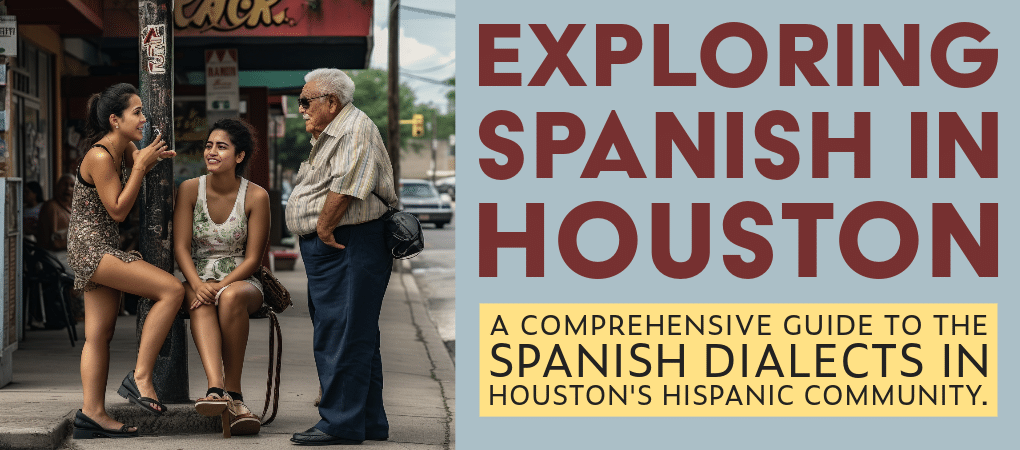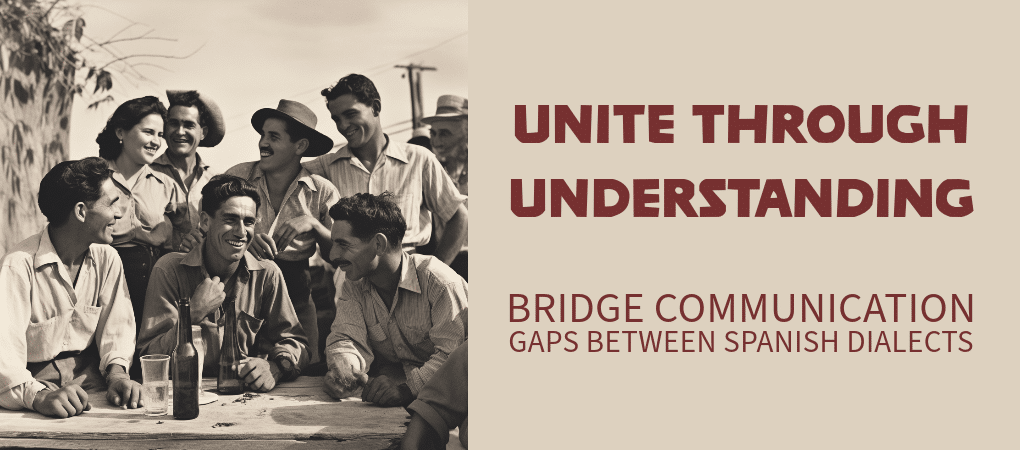
Introduction
Houston boasts a diverse population, with over 40% of its residents identifying as Hispanic. This multi-cultural city is a hub for various Spanish dialects, making it essential for businesses and individuals to understand these nuances for effective communication within the Hispanic community. Spanish, like any other language, has evolved uniquely in different regions due to factors such as immigration, indigenous influences, and contact with English through industrialization and commerce.
Let’s explore the factors that contribute to these variations in Spanish dialects within Houston. For a more comprehensive view of the linguistic diversity in the city, you might be interested in reading about the Languages Spoken in Houston.
Why Are There Differences in Spanish?
Spanish, a language spoken in over 20 countries, has many distinct dialects. Factors such as industrialization and global marketing have significantly impacted the Spanish spoken in different regions, including Mexico. Indigenous influences have also played a part in shaping the differences in Spanish dialects.

Industrialization and Global Marketing
The industrialization of Mexico by companies from the United States and Europe has led to the adoption of certain English words and phrases in Mexican Spanish. The advertising and branding efforts of global companies have introduced English words into Mexican Spanish, creating distinctions between it and other dialects like Cuban, Castilian, or Argentine Spanish.
Indigenous Influences
In Mexico, the Spanish language has interwoven with indigenous languages like Nahuatl, resulting in unique words and expressions. In contrast, Argentina’s Spanish may have influences from indigenous languages such as Quechua and Guarani. These indigenous influences add rich layers of meaning and cultural context to the Spanish spoken in different regions, further distinguishing them from one another.
Now that we’ve examined the global influences on Spanish, let’s focus on how these factors have shaped the language in Houston specifically
The Evolution of Spanish in Houston
Houston’s diverse Hispanic population has been shaped by waves of immigration from various Spanish-speaking countries. Industrialization and global marketing have also influenced the Spanish spoken in Houston. Further, a blend of Spanish and English, known as Spanglish, has emerged in Houston as a reflection of cultural blending.
The Impact of Immigration
Each wave of immigration to Houston has brought its unique dialect, cultural practices, and influences. These waves have contributed to the rich tapestry of Spanish dialects spoken in the city.
Industrialization and Global Marketing
The industrialization of Mexico by U.S. and European companies, along with marketing initiatives by global firms, has led to the adoption of certain English words in Mexican Spanish. This has created distinctions between Mexican Spanish and other dialects like Cuban, Castilian, or Argentine Spanish.
Indigenous Influences
Different regions have been influenced by indigenous languages, adding unique characteristics to the Spanish spoken there. For example, Mexican Spanish has been shaped by Nahuatl, while Argentine Spanish may have influences from Quechua and Guarani.
Spanglish: A Reflection of Cultural Blending
In Houston, a significant Mexican American population has led to the emergence of Spanglish. This dialect features code-switching between Spanish and English, creating hybrid words and phrases. Spanglish is a living testament to the close cultural and linguistic ties between English and Spanish in the region.
Understanding these variations is just the beginning; choosing the right dialect for your audience in Houston requires careful consideration.

Choosing the Right Spanish Dialect for Houston’s Audience
When looking to engage with the Hispanic community in Houston, it’s crucial to recognize that Spanish is not a monolithic language. The Spanish spoken in different regions varies in pronunciation, vocabulary, and colloquial expressions. This variation can lead to misunderstandings or even comical situations, as words that mean one thing in one country might mean something entirely different in another.
Need help navigating the complexities of Spanish dialects in Houston?
Contact 24 Hour Translation Services today for expert guidance.
Phone: (713) 589-3112 Email: [email protected]The Cuban Spanish Challenge
Consider hiring a Spanish translation company based in Miami, where Cuban Spanish might be predominant. Cuban Spanish has unique characteristics, such as a nasal accent and rhythmic intonation, influenced by African settlers. While it’s the same language, the differences in vocabulary and expressions might make it seem foreign or strange to a Mexican American audience in Houston.
For example, a word that’s a common term in Cuban Spanish might be a slang or even a curse word in Mexican Spanish. These nuances can lead to confusion or unintended offense.
Avoid misunderstandings and connect with your audience effectively.
Choose 24 Hour Translation Services for culturally aware translations.
Get Started TodayThe Argentine Spanish Dilemma
Similarly, if you were to hire a company in California that utilizes translators from Argentina, you might encounter challenges. Argentine Spanish may come across as too formal or uncomfortable to an audience of Mexican Americans in Houston. The differences in terminology, word choices, and formalities could create a disconnect with your intended audience.
A Houston-Focused Approach
The anecdotes and experiences shared by various Spanish speakers across different countries highlight the importance of understanding the specific dialect and cultural context of your target audience. In Houston, where Mexican Spanish is more common, it’s essential to choose translators who are familiar with this dialect.
A Mexican friend might be thrilled by an invitation from a Venezuelan using the word “pasapalos” for snacks, only to find out it means something entirely different in Mexican Spanish. Such misunderstandings can be amusing in personal interactions but can lead to miscommunication in business or marketing content.
With these challenges and considerations in mind, let’s summarize the key takeaways and how businesses can navigate the diverse linguistic landscape of Houston.
Conclusion
Spanish is a rich and diverse language, reflecting the unique cultures and histories of different regions. In Houston, where the Hispanic community is diverse, understanding these nuances is essential for effective communication. Whether it’s the nasal accent of Cuban Spanish or the formalities of Argentine Spanish, recognizing these variations and selecting the right translators can make all the difference.
Misunderstandings or even comical situations can arise from not recognizing these differences. By being cautious and considerate in your choice of translators, you can build stronger relationships and foster business success in this vibrant city.
Reaching Houston’s Hispanic communities goes beyond mere translation. It’s about conveying meaning and context that align with the cultural and linguistic landscape of Houston. Connect with local experts like 24 Hour Translation Services to ensure that your messaging resonates with your target audience.
Ready to reach Houston’s Hispanic communities with precision?
24 Hour Translation Services is here to help with customized Spanish dialect translation and localization.
Contact us today to get started:
Phone: (713) 589-3112 Email: [email protected]Frequently Asked Questions
Houston is home to various Spanish dialects, including Mexican Spanish, Cuban Spanish, and Argentine Spanish. The city’s diverse Hispanic population has shaped this rich linguistic tapestry.
Cuban Spanish has unique characteristics like a nasal accent and rhythmic intonation, influenced by African settlers. These differences might make it seem foreign or strange to a Mexican American audience in Houston.
Choosing the right Spanish dialect ensures that your messaging resonates with your target audience. Misunderstandings or even comical situations can arise from not recognizing these differences, impacting the effectiveness of communication.
24 Hour Translation Services offers customized Spanish dialect translation and localization services tailored to Houston’s Hispanic communities. They provide expert guidance in selecting the right dialect and ensuring culturally aware translations.
Spanglish is a blend of Spanish and English, featuring code-switching between the two languages. In Houston, Spanglish has emerged as a reflection of cultural blending, especially among the Mexican-American population.
Connect With Local Experts
24 Hour Translation Services
- Spanish Dialect Translation
- Marketing Content Localization
- Multilingual Chat Support
Contact us today to get started:
Phone: (713) 589-4660
Email: [email protected]
Get Started Today
Contact 24 Hour Translation Services to get help reaching Houston’s Hispanic communities through customized Spanish dialect translation and localization services.
